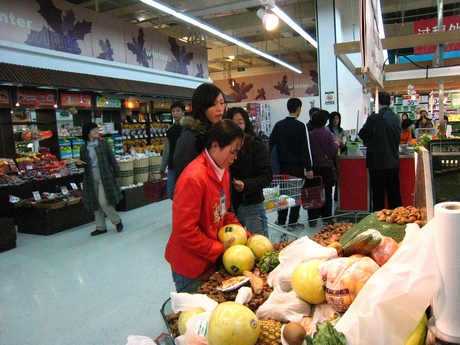 nic produce will increase following a deal between the U.K.’s Soil Association and China’s Organic Food Development Center in mid-April that simplifies the entry of British contractors into the Chinese market.
nic produce will increase following a deal between the U.K.’s Soil Association and China’s Organic Food Development Center in mid-April that simplifies the entry of British contractors into the Chinese market.Currently, Chinese authorities follow only their own organic regulatory system for goods imported into China, and organic products have to be inspected and certified with respect to Chinese organic standards.
“This new partnership has been set up to make it easier for Soil Association-certified licensees to obtain Chinese certification for their products,” says the Soil Association.
Before the agreement, applying for permission to export organic produce to China was a complex procedure. Prospective exporters had to go through and pay for the whole process on their own. Therefore, the range of imported organic products in China has been smaller than it could have been.
But the Chinese demand for high-quality organic products from abroad has been growing steadily since the mid-2000s. “Chinese consumers are prepared to pay a premium for products they consider to be healthy, high-quality and safe,” says the China-Britain Business Council.
Now the U.K.’s Soil Association, which grants organic licenses to British suppliers, is offering to handle contact with the Chinese authorities on its members’ behalf.
“Working with OFDC will make the process of certification for our U.K. licensees wanting to export to China both efficient and cost-effective,” says Emma Yeats, the Soil Association’s senior certification manager. “We are delighted with this partnership, which helps develop an important export opportunity.”
According to a study commissioned by the International Trade Centre in 2011, neither the value nor volume of organic imports into China, nor the exact size of China’s domestic organic market, can be determined precisely. There are only a few estimates from private consultants, which recognize that both the importing of organic produce and its home production have increased. The Soil Association, however, agrees with BioFach, the organizer of the leading organic trade fair in China, which estimates the Chinese organic market will be worth $7.8 billion by 2015.
The spectrum of organic products that the Chinese themselves can produce is huge. “China has a wide range of agro-climatic conditions that allows production of a wide range of crops and animals,” the ITC states in a technical paper on organic food products in China.
The only organic products that cannot be produced in China are tropical fruits and certain vegetables. But not all goods produced in China meet the quality demands of Chinese organic consumers. Instead, many of them would rather buy high-quality organic produce from abroad.
“It is possible to divide organic consumers in China into eight main groups,” says the ITC. Most are said to be wealthy and well educated. According to the ITC, white-collar families, overseas returnees, business associates and government officials are typical organic consumers in China. But young people, families with young children, families with health problems and foreigners living in China also prefer buying organic goods.
Right now, the Soil Association processes many requests from members asking to be allowed to export their produce to China. “The partnership has caused lots of interest amongst Soil Association licensees, but this is just the start of a process. The long-term goal is free trade of organic produce between Europe and China,” the charity says.





